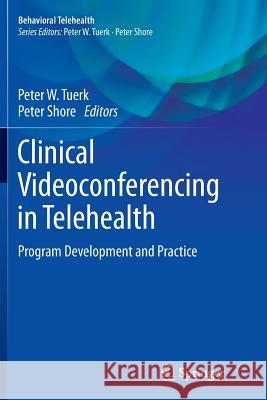Clinical Videoconferencing in Telehealth: Program Development and Practice » książka
topmenu
Clinical Videoconferencing in Telehealth: Program Development and Practice
ISBN-13: 9783319346885 / Angielski / Miękka / 2016 / 259 str.
Kategorie:
Kategorie BISAC:
Wydawca:
Springer
Seria wydawnicza:
Język:
Angielski
ISBN-13:
9783319346885
Rok wydania:
2016
Wydanie:
Softcover Repri
Numer serii:
000763067
Ilość stron:
259
Waga:
0.47 kg
Wymiary:
15.7 x 23.4 x 1.4
Oprawa:
Miękka
Wolumenów:
01
Dodatkowe informacje:
Wydanie ilustrowane











